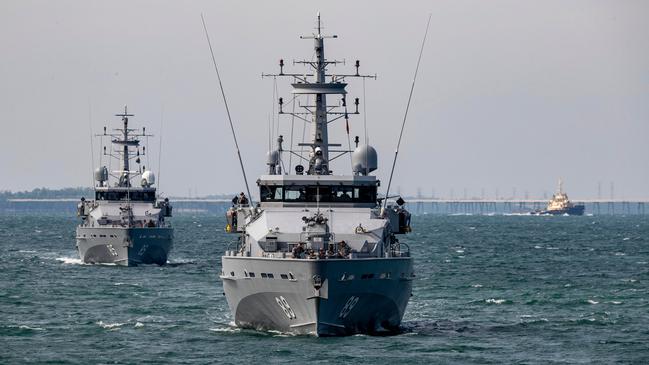Darwin, Australia’s natural northern bulwark.
Darwin port has always been a safe haven and vital asset in a sometimes unstable region.

In 2006, at the request of the East Timor Government, an Australian Defence Force task force was hastily sent to the restive territory to restore public order, a response to worsening inter communal violence that had brought the newly independent half island territory to the point of civil war.
Dubbed Operation Astute, Darwin was again transformed into a major forward operating base to serve the new peacekeeping mission. The RAN’s commitment to Astute represented the largest amphibious task force it had ever deployed. US air support for the mission involved C-17 Globemasters operating out of Townsville and Darwin.
The timely response provided by Australia and her allies helped avert the young nation’s worst post-independence crisis and the operation was judged a resounding success. Six years earlier in September 1999, Darwin’s crucial role as a springboard for the massive UN-backed Australian-led International Force in East Timor, INTERFET, involving 20 countries and more than 5000 Australian defence personnel again highlighted the case for a northern FOB. It wasn’t all one-way traffic.
It should not be forgotten that 2700 Timorese evacuees found sanctuary in Darwin after fleeing murderous militia violence following the historic ballot for independence. The Bali bombing terrorist attack on October 12, 2002, which claimed more than 200 lives, including 88 Australians, meant Darwin with its world class medical facilities became the principle reception centre receiving more than 60 of the most seriously injured victims.
Darwin has proved its worth time and again. None of these outcomes could have been made possible without the Top End’s capital’s infrastructure — not for the first time — defining its indispensable strategic value for defence planners.
Over the past two decades, Darwin has proven its value as a base to respond to a variety of key tasks whether humanitarian assistance, disaster relief, or peacekeeping. However, its strategic potential as a gateway to the Indo-Pacific deserves more attention from Canberra.
As ASPI’s Anthony Bergin has already flagged, Darwin’s role as a defence hub is crucial if Australia is to fulfil its Defence White Paper ambitions.
To sharpen the focus on regional defence engagement, Darwin is a natural choice as base for an Australian defence regional engagement centre that could take full advantage of its proximity to the Asian region and to the main military exercise areas in the far north.
The Northern Territory Government’s commitment to the Darwin Ship Lift Project, when completed, the largest ship lift in Northern Australia, further underlines the strategic value of Top End defence hub.
With a lifting capability of 5000 tonnes, it will enable the maintenance and servicing of Defence and Border Force vessels, maritime assets of the offshore oil and gas industries and conceivably coastal craft operated by our near neighbour, Timor Leste.
This project takes added significance from Defence’s commitment to remain Timor Leste’s principal security partner and major beneficiary of replacement patrol boats under the auspices of the Pacific Maritime Security Programme.
The 2016 Defence White Paper committed the Government to increasing Defence’s international engagement particularly with countries in the South Pacific and South-East Asia. Darwin provides a fit-for-purpose hub from which to base ADF assets prior to deployment into the region as part of its enhanced international exercises.
Darwin’s geographic position demands priority from promised increased defence investment
The DWP warns that Australia cannot be secure if our immediate neighbourhood, including Papua New Guinea, Timor Leste and Pacific Island countries, becomes a source of threat to Australia. It follows that Darwin’s geographic position demands priority from promised increased defence investment in Australia’s military bases to support the development of new capabilities to be called on in the event of any attack or threats on our territory.
Darwin’s role in the US Pacific pivot continues to grow following the ninth Marine Rotational Force Darwin (MRF-D) deployment, scaled back this year to mitigate risks due to COVID-19. Some 1200 Marines were able to train through the dry season with ADF at defence facilities across the Darwin area including Mt Bundey and Kangaroo Flats.
Finally, with US-China relations becoming increasingly adversarial it would be prudent to capitalise on the utility of Darwin as a key northern bulwark to defend against potential overt military aggression and coercion.
Mark Dodd spent more than a decade reporting from South-East Asia for both Reuters and Fairfax newspapers. He was The Australian’s defence and foreign affairs correspondent from
2006-2012.
